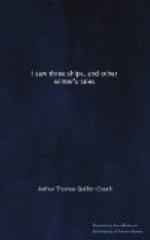“An the wreck’s scat abroad,” continued Old Zeb; an’ the interpretation thereof is barrels an’ nuts. What’s more, tide’ll be runnin’ for two hour yet; an’ it hasn’ reached my ears that the fashion of thankin’ the Lord for His bounty have a-perished out o’ this old-fangled race of men an’ women; though no doubt, my dear, you’d get first news o’ the change, with a bed-room window facin’ on Ruan Cove.”
“Thank you, Old Zeb; I’ll be careful to draw my curtains,” said she, answering sarcasm with scorn, and turning on her heel.
The old man stooped to lift the sailor again. “Better clog your pretty ears wi’ wax,” he called after her, “when the kiss-i’-the-ring begins! Well-a-fine! What a teasin’ armful is woman, afore the first-born comes! Hey, Sim Udy? Speak up, you that have fifteen to feed.”
“Ay, I was a low feller, first along,” answered Sim Udy, grinning. “‘Sich common notions, Sim, as you do entertain!’ was my wife’s word.”
“Well, souls, we was a bit tiddlywinky last Michaelmas, when the Young Susannah came ashore, that I must own. Folks blamed the Pa’son for preachin’ agen it the Sunday after. ‘A disreppitable scene,’ says he, ‘’specially seein’ you had nowt to be thankful for but a cargo o’ sugar that the sea melted afore you could get it.’ (Lift the pore chap aisy, Sim.) By crum! Sim, I mind your huggin’ a staved rum cask, and kissin’ it, an’ cryin’, ‘Aw, Ben—dear Ben!’ an’ ‘After all these years!’ fancyin’ ’twas your twin brother come back, that was killed aboard the Agamemny—”
“Well, well—prettily overtook I must ha’ been. (Stiddy, there, Crowder, wi’ the legs of en.) But to-day I’ll be mild, as ’tis Chris’mas.”
“Iss, iss; be very mild, my sons, as ’tis so holy a day.”
They tramped on, bending their heads at queer angles against the weather, that erased their outlines in a bluish mist, through which they loomed for a while at intervals, until they passed out of sight.
Ruby, meanwhile, had hurried on, her cloak flapping loudly as it grew heavier with moisture, and the water in her shoes squishing at every step. At first she took the road leading down-hill to Ruan Cove, but turned to the right after a few yards, and ran up the muddy lane that was the one approach to Sheba, her father’s farm.
The house, a square, two-storeyed building of greystone, roofed with heavy slates, was guarded in front by a small courtlage, the wall of which blocked all view from the lower rooms. From the narrow mullioned windows on the upper floor, however, one could look over it upon the duck-pond across the road, and down across two grass meadows to the cove. A white gate opened on the courtlage, and the path from this to the front door was marked out by slabs of blue slate, accurately laid in line. Ruby, in her present bedraggled state, avoided the front entrance, and followed the wall round the house to the town-place, stopping on her way to look in at the kitchen window.




